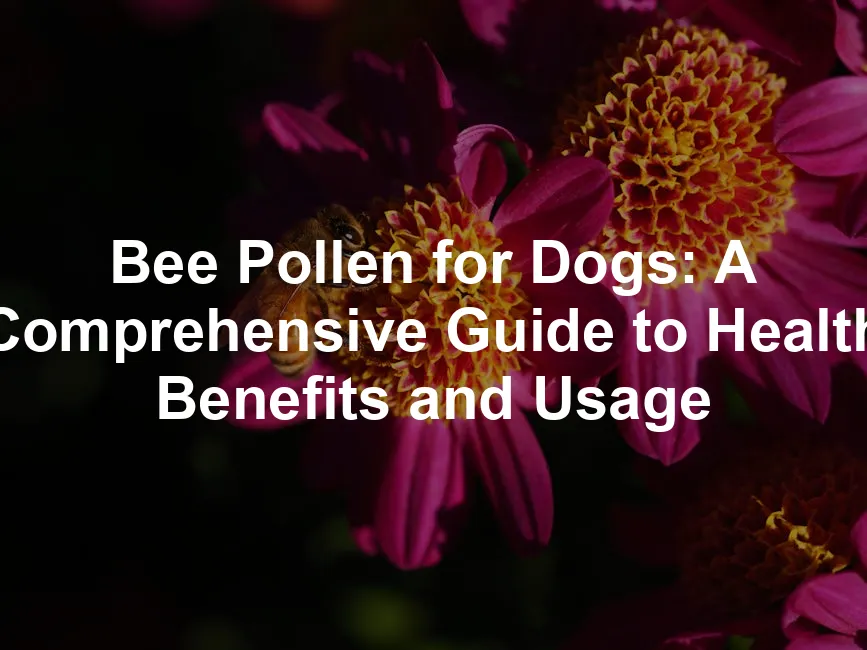You can find bee pollen in granules or powder form. Both options are effective, but granules are often easier to mix into meals. Always opt for high-quality, organic bee pollen to ensure your pet’s safety and health.

Speaking of high-quality products, consider adding Dog Joint Supplements to support your pup’s mobility, especially if they are older or very active!
Potential Side Effects and Precautions
While bee pollen is generally safe, some dogs may have allergies. Common symptoms include itching, swelling, or digestive issues. If these occur, discontinue use immediately. It’s crucial to monitor your dog after introducing any new supplement.
Always consult with your veterinarian before starting bee pollen. They can provide guidance based on your dog’s specific health needs. Pregnant or nursing dogs should avoid bee pollen, as it could cause complications.
Remember, not all dogs will tolerate bee pollen. If your dog has a history of allergies, proceed with caution. Always prioritize your pet’s health and well-being when trying new supplements.
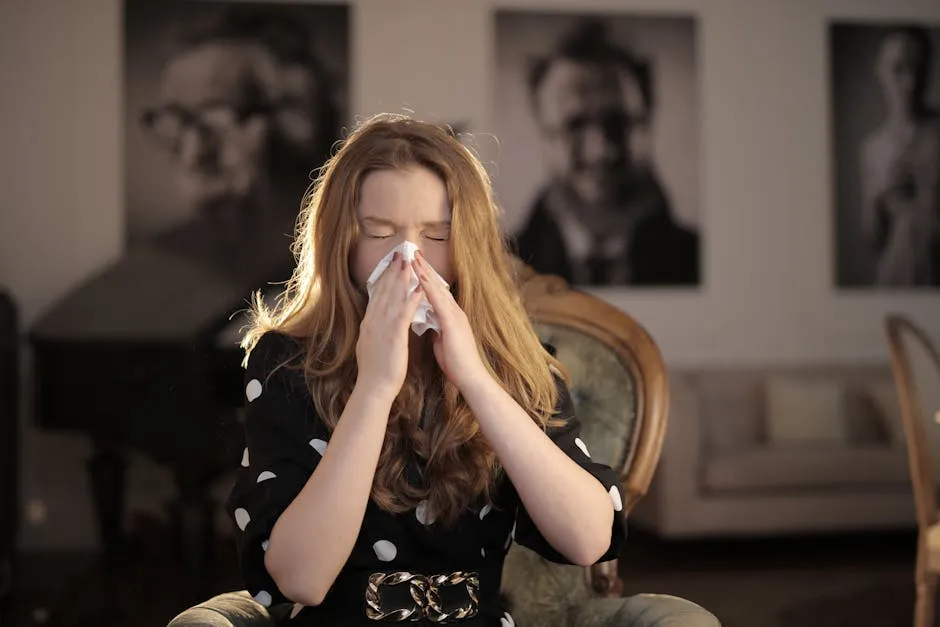
Choosing Quality Bee Pollen Products
When selecting bee pollen for your dog, quality matters. Always opt for organic and toxin-free products. These options ensure safety and nutritional value, keeping your furry friend healthy.
Start by looking for reputable brands. Companies committed to quality often provide detailed information about sourcing. Check for certifications on labels, such as USDA organic or non-GMO certifications. These indicate the product is free from harmful chemicals.
Pay attention to purity. Pure bee pollen should contain no fillers or additives. Granules should be bright and fragrant, indicating freshness. If you find any unusual colors or odors, it’s best to avoid that product.
Consider sourcing. Bee pollen from diverse floral sources generally offers richer nutrients. Local products can also be beneficial, as they may help with local allergens.
For the best results, try purchasing from well-known health food stores or specialized pet supplement retailers. By choosing high-quality bee pollen, you can effectively enhance your dog’s diet and health.
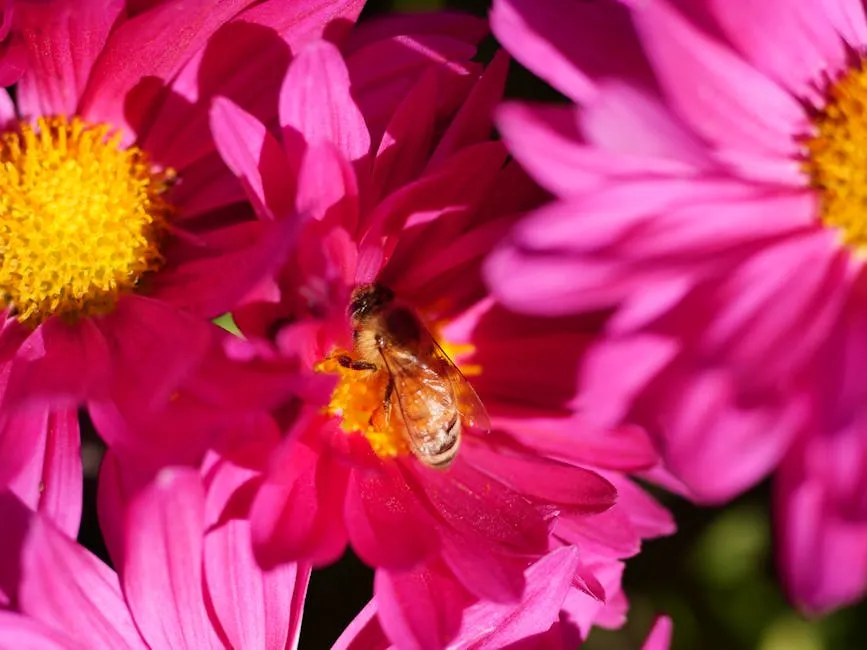
And while you’re shopping, don’t forget to check out some Dog Grooming Kits. A well-groomed dog is a happy dog, and grooming can help keep their skin and coat healthy too!
Conclusion
Bee pollen presents numerous benefits for dogs, from immune support to improved skin health. It’s a fantastic supplement to consider. However, always consult your veterinarian before adding it to your pet’s diet. They can help tailor recommendations based on your dog’s specific needs. Remember, a balanced diet is crucial for your dog’s overall well-being.
FAQs
Can all dogs take bee pollen?
Not all dogs can safely consume bee pollen. Some may have allergies or sensitivities. If your dog is prone to allergies, consult your vet first. Start with a small amount to monitor for any reactions. Symptoms may include itching, swelling, or digestive upset. If any of these occur, stop giving bee pollen immediately.
How much bee pollen should I give my dog?
Dosage depends on your dog’s weight. A general guideline is about 1 teaspoon for a 20-pound dog. For larger dogs, increase the amount accordingly. Always start with a smaller dose, around one-third of the recommended amount. Gradually increase it over a week or two, watching for any adverse reactions.
Is bee pollen safe for puppies?
Puppies can take bee pollen, but caution is needed. Their immune systems are still developing. It’s best to wait until they are at least 12 weeks old. Always consult your veterinarian before introducing any new supplement to a puppy’s diet. They can guide you on the appropriate age and dosage.
What are the signs that my dog is allergic to bee pollen?
Signs of an allergic reaction may include itching, swelling, or gastrointestinal issues. Look for changes in behavior or appetite as well. If you notice any of these symptoms, cease giving bee pollen. Contact your veterinarian for further advice on how to proceed.
Where can I buy quality bee pollen for dogs?
You can find quality bee pollen at health food stores or online retailers. Look for reputable brands that offer organic and non-GMO options. Check reviews and product certifications for quality assurance. Some well-known sources include local pet supply shops or specialty online stores focusing on pet supplements.
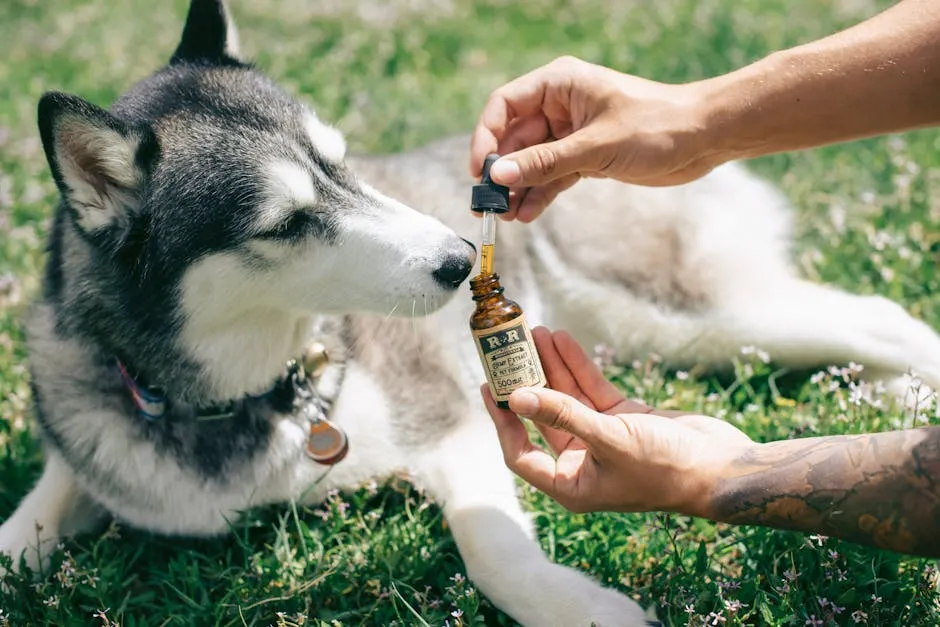
Speaking of quality, don’t forget to equip your dog with some Dog Nail Clippers. Keeping their nails trimmed is essential for their comfort and health!
Please let us know what you think about our content by leaving a comment down below!
Thank you for reading till here 🙂
For more information on the benefits of bee pollen, check out this article on bee pollen for dogs.
All images from Pexels
Introduction
Have you ever considered adding something special to your dog’s diet? Bee pollen is gaining traction among pet owners as a natural supplement. Packed with nutrients, it can boost your furry friend’s health. This article aims to cover the benefits, usage, and safety of bee pollen for dogs.
Speaking of boosting health, why not consider some Dog Vitamins and Supplements? They can provide essential nutrients that might be lacking in your pup’s diet, ensuring they stay sprightly and perky!
Summary and Overview
Bee pollen is a natural substance collected by bees from flowering plants. They mix pollen with nectar and saliva, creating tiny granules. These granules are rich in proteins, vitamins, and minerals. This nutritional powerhouse offers several health benefits for dogs. It can support the immune system, aid in allergy relief, and improve overall vitality. However, always consult your veterinarian before introducing any new supplements to your dog’s diet. Their guidance ensures your pet receives the best care tailored to their needs.
And while you’re at it, consider pairing bee pollen with some High-Quality Dog Food. A balanced diet is crucial for maintaining your dog’s overall well-being!
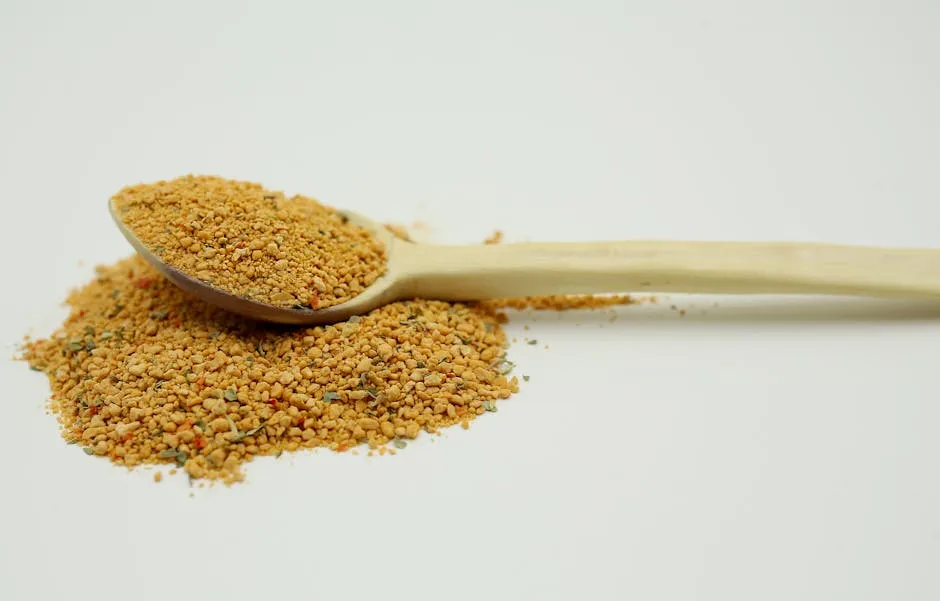
Health Benefits of Bee Pollen for Dogs
Nutritional Profile of Bee Pollen
Bee pollen is a nutritional gem for dogs. It boasts a mix of proteins, fats, vitamins, and minerals. This diverse composition makes it an excellent addition to your dog’s diet. The proteins in bee pollen contain essential amino acids. These amino acids are crucial for growth and muscle maintenance.
You’ll find vitamins A, B-complex, C, and E in bee pollen. Each vitamin plays a vital role in supporting your dog’s overall health. For instance, Vitamin A promotes healthy vision and skin. B vitamins enhance energy levels and aid metabolism.
Moreover, bee pollen is rich in antioxidants. These compounds help protect your dog’s cells from damage caused by free radicals. Research shows that bee pollen may contain five to seven times more amino acids than an equivalent weight of beef. This makes it a fantastic choice for boosting your dog’s nutritional intake.
To further support your dog’s health, consider adding Omega-3 Fish Oil for Dogs into their routine. It’s known to promote a healthy coat and skin, which can amplify the benefits of bee pollen!
In summary, bee pollen is a dog superfood packed with nutritional benefits. Incorporating it into your dog’s diet can lead to a healthier and happier pet.
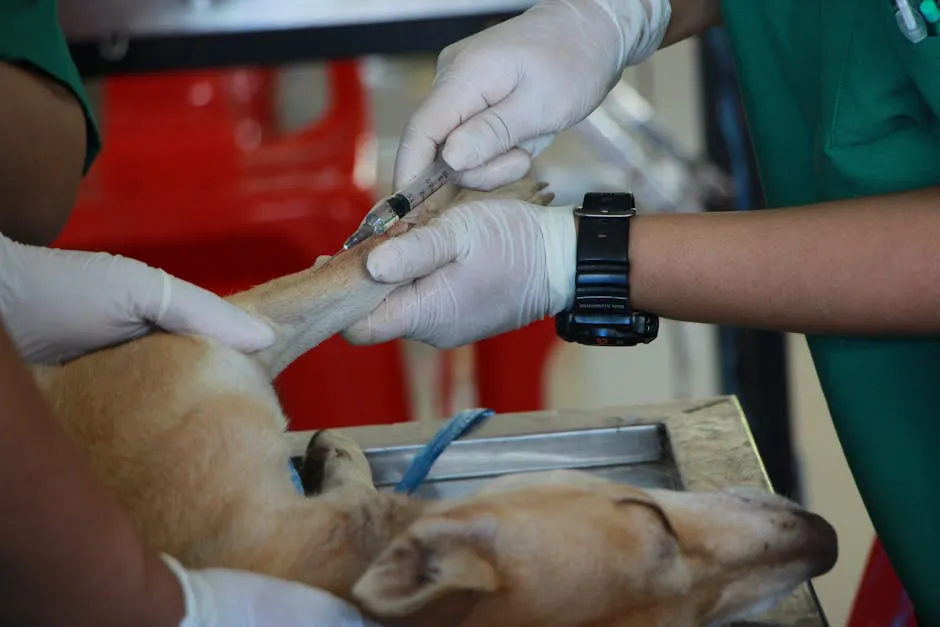
12 Notable Health Benefits
1. Natural Antihistamine: Bee pollen can reduce allergy symptoms. It helps dogs build tolerance to allergens over time.
2. Immune System Support: Rich in antioxidants, it strengthens the immune response, keeping your dog healthy.
3. Skin Health Improvement: Bee pollen enhances skin hydration and promotes a shiny coat. It’s beneficial for dogs with skin conditions.
4. Digestive Aid: It supports gut health, helping with nutrient absorption and regular bowel movements.
5. Energy Boost: Many pet owners report increased vitality in their dogs. Bee pollen provides a natural energy lift.
6. Weight Management: It can help regulate weight by promoting healthy metabolism and reducing cravings.
7. Anti-inflammatory Properties: Bee pollen helps alleviate inflammation, which is great for active or older dogs.
8. Supports Liver Health: It aids in liver function, promoting detoxification and overall wellness.
9. Promotes Healthy Aging: The antioxidants in bee pollen may slow the aging process, enhancing quality of life.
10. Heart Health: It supports cardiovascular health by improving blood circulation and reducing cholesterol levels.
11. Strengthens Bones: The minerals in bee pollen contribute to stronger bones and overall skeletal health.
12. Improves Mood: Some studies suggest that bee pollen can help reduce stress and anxiety in dogs, promoting a calmer demeanor.
Incorporating bee pollen into your dog’s diet can yield these remarkable benefits. Always consult with your veterinarian before starting any new supplement. This ensures your dog’s health needs are met effectively.
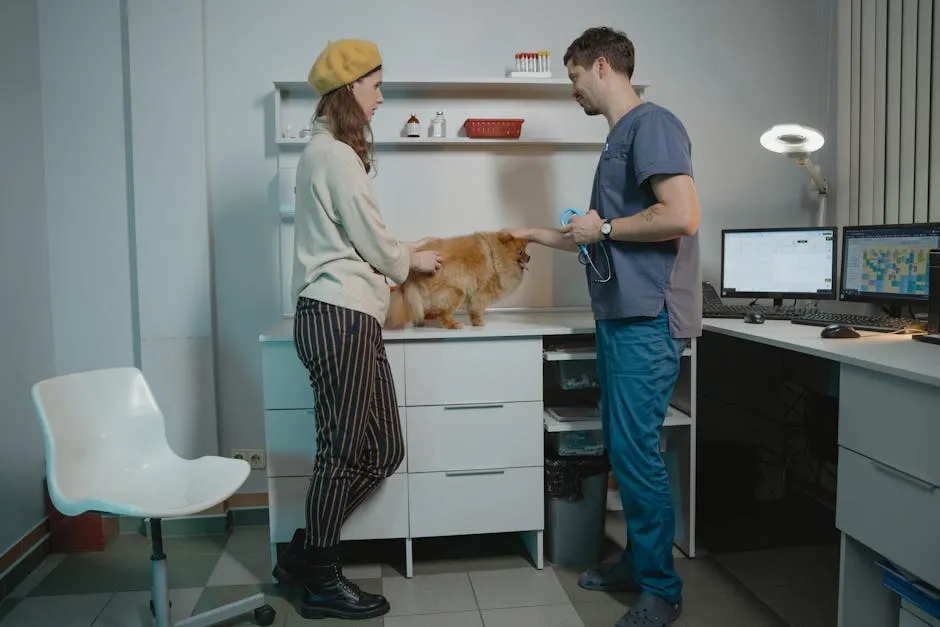
How to Introduce Bee Pollen to Your Dog’s Diet
Introducing bee pollen to your dog’s diet can be beneficial. Start with small doses to gauge tolerance. It’s best to sprinkle a tiny amount on their food. Gradually increase the dosage over a few weeks. This slow introduction helps prevent any digestive upset.
For proper dosing, consider your dog’s weight. Generally, a dog weighing 20 pounds can have 1/2 teaspoon daily. For larger dogs, the dosage increases. A 50-pound dog can take around 1 teaspoon. Refer to a dosage chart for accurate measurements.
Watch for signs of sensitivity. Symptoms like itching, stomach upset, or unusual behavior can indicate an adverse reaction. If you notice any of these, reduce the amount or stop altogether.
You can find bee pollen in granules or powder form. Both options are effective, but granules are often easier to mix into meals. Always opt for high-quality, organic bee pollen to ensure your pet’s safety and health.

Speaking of high-quality products, consider adding Dog Joint Supplements to support your pup’s mobility, especially if they are older or very active!
Potential Side Effects and Precautions
While bee pollen is generally safe, some dogs may have allergies. Common symptoms include itching, swelling, or digestive issues. If these occur, discontinue use immediately. It’s crucial to monitor your dog after introducing any new supplement.
Always consult with your veterinarian before starting bee pollen. They can provide guidance based on your dog’s specific health needs. Pregnant or nursing dogs should avoid bee pollen, as it could cause complications.
Remember, not all dogs will tolerate bee pollen. If your dog has a history of allergies, proceed with caution. Always prioritize your pet’s health and well-being when trying new supplements.

Choosing Quality Bee Pollen Products
When selecting bee pollen for your dog, quality matters. Always opt for organic and toxin-free products. These options ensure safety and nutritional value, keeping your furry friend healthy.
Start by looking for reputable brands. Companies committed to quality often provide detailed information about sourcing. Check for certifications on labels, such as USDA organic or non-GMO certifications. These indicate the product is free from harmful chemicals.
Pay attention to purity. Pure bee pollen should contain no fillers or additives. Granules should be bright and fragrant, indicating freshness. If you find any unusual colors or odors, it’s best to avoid that product.
Consider sourcing. Bee pollen from diverse floral sources generally offers richer nutrients. Local products can also be beneficial, as they may help with local allergens.
For the best results, try purchasing from well-known health food stores or specialized pet supplement retailers. By choosing high-quality bee pollen, you can effectively enhance your dog’s diet and health.

And while you’re shopping, don’t forget to check out some Dog Grooming Kits. A well-groomed dog is a happy dog, and grooming can help keep their skin and coat healthy too!
Conclusion
Bee pollen presents numerous benefits for dogs, from immune support to improved skin health. It’s a fantastic supplement to consider. However, always consult your veterinarian before adding it to your pet’s diet. They can help tailor recommendations based on your dog’s specific needs. Remember, a balanced diet is crucial for your dog’s overall well-being.
FAQs

Speaking of quality, don’t forget to equip your dog with some Dog Nail Clippers. Keeping their nails trimmed is essential for their comfort and health!
Please let us know what you think about our content by leaving a comment down below!
Thank you for reading till here 🙂
For more information on the benefits of bee pollen, check out this article on bee pollen for dogs.
All images from Pexels

